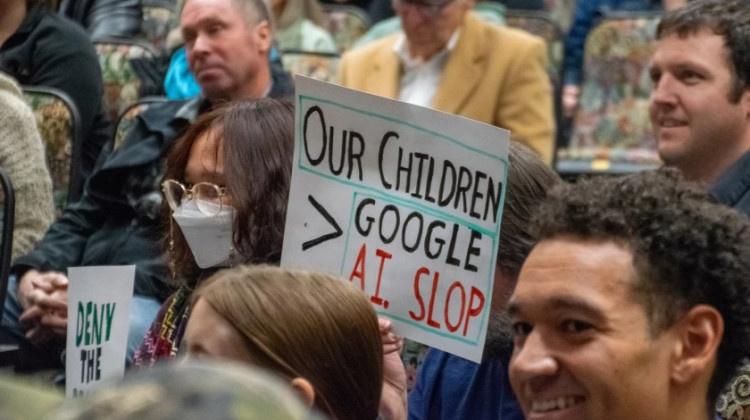
Julie Mennel is the expungement help desk manager for the Neighborhood Christian Legal Clinic in Indianapolis. She helps clients navigate the expungement process and seal their records from public view.
Courtesy of the Neighborhood Christian Legal ClinicWhen Jade was a sophomore in college, they were arrested and charged with a DUI. They hid their arrest from friends out of shame, and have tried to hide it from employers as well -- so we’ve agreed to use just their middle name for this story.
“The day that I had court, I was like, ‘I have to get this off my record,’” they recalled. “The fact that you have a record, there are places that will definitely not hire you.”
Jade saw those effects almost right away. They applied for a summer job, but their background check took until the end of July to clear. They ended up taking a lower-paying position and making less headway on their student loans. Then, their graduate school admission was put on hold for extra review once their DUI came to light.
The thought of missing out on graduate school due to a criminal record put Jade in an emotional tailspin.
“It was very heartbreaking, honestly,” they recalled. “I spent hours crying, because -- I’m a first generation college student. So even going to college was a super big deal. And then, to find out that the one thing that I've been working my entire collegiate career towards might not actually happen was just horrifying.”
While concrete numbers are hard to pin down, researchers estimate that one in seven Americans has a misdemeanor on their criminal record, amounting to around 45 million people. Another 19 to 24 million people have felony convictions, though some overlap between those two groups is possible.
For many Hoosiers with a criminal record, there is another option: filing for an expungement through Indiana’s “second chance” law.
Despite the definition of the word itself, expungements in Indiana don’t destroy records -- they simply seal them from public view. Under the 2013 law, expungements are available five years after any misdemeanor and eight years after most felony convictions in Indiana, with exceptions for crimes involving homicide, human trafficking, sex crimes, or perjury. Expunged misdemeanors are fully sealed from view on a criminal record, while expunged felonies are marked as “expunged.” You can only file for an expungement of all criminal records once in your lifetime.
“It was basically a program that no one really knew how to implement,” Marion County Deputy Prosecutor Andrew Fogle said of the state’s second chance law, reflecting on when it first passed in 2013. “No one knew how large it was going to get. No one knew what advantages you could do.”
Eight years later, Fogle sees expungements as one of the highlights of his job.
“It's really fun,” he said. “It's one of the few things you can do as a prosecutor that doesn't have a negative connotation to it. Now, it starts off with a negative connotation, but at least you can help fix it.”
Financial Benefits -- And Barriers -- To Expungements
Maybe you got a DUI in your 20s. Maybe you stole diapers from a Walmart as a young mom. No matter how long ago it was, having even a single criminal conviction on your record can affect your ability to get a higher-paying job, quickly clear background checks, or even rent an apartment.
National research published by the Brennan Center shows that the average earnings for someone with a criminal record drop by anywhere from 16 percent after a misdemeanor to 52 percent after imprisonment. Those earnings gaps are even more stark among Black and Latino men, who are also disproportionately impacted by the criminal justice system.
That’s where an expungement can make a big difference. Indiana law bars employers or housing agencies from using expunged records as basis for discrimination, making it an appealing option for someone looking for a clean slate and access higher wages or better housing. A 2020 study from the University of Michigan found that of people who were able to file for expungements, their wages went up by an average of 22 percent within just one year.
Since Indiana’s second chance law passed in 2013, local expungement assistance programs have continued to expand their reach. Julie Mennel works at the Expungement Help Desk for the Neighborhood Christian Legal Clinic, which processes about half of all the expungements filed in Marion County. From 2016 through 2019 -- the last three years where data are available -- Mennel’s desk recorded a 150 percent increase in expungement petitions they’ve helped people file.
Her work doesn’t just help clients get better jobs or housing.
“I had a man that came to me once, and I don’t remember what he had been convicted of long ago,” Mennel recalled. “But his daughter was hit and killed by a semi driver on [State Route] 37, and he couldn't get his child out of foster care because of this.”
But, Mennel points out that there are still barriers to getting a record expunged -- and one of the biggest is outstanding court costs and fees. To start, there’s a $157 filing fee for the entire petition, per county; if someone has cases in multiple counties, they pay an additional $157 for each new county.
On top of that, people filing for an expungement have to pay off all debts owed to the court system. Mennel said that while it’s possible to waive both the older court fees and expungement filing fees based on income, it’s not a legal guarantee. For many clients, those fees can add up fast.
“There's people who have lots of cases in multiple counties, and they can be paying thousands of dollars for an expungement,” she said. “And face it, how many people can really afford to do that?”
Cycles Of Poverty
For Jade -- the college student with the DUI -- paying off court costs was one of the biggest barriers to filing for an expungement. One of the first things Jade’s probation office walked them through after their conviction was the court fees they owed, which came out to just over $1,000.
“There was just about a fee for everything, to be honest,” they said. “There was the victim impact panel fee, there was the probation fee, the court fee -- all kinds of weird and crazy things.”
After deliberately chipping away at those fees, Jade paid everything off and filed for an early expungement late last year. Their expungement was granted in February.
While court fees and fines like Jade’s exist to offset the administrative costs needed to keep a court up and running, they often end up hitting vulnerable people hardest, and play a role in exacerbating cycles of poverty.
Jessica Beheydt, an attorney who works at a different expungement help desk in Bloomington with Indiana Legal Services, sees the impact of those fees up close. She said it’s rare for her clients to stop pursuing an expungement because they can’t afford to pay any fees she can’t help waive.
“They often borrow money from family members, they use their tax refunds, they forego paying other bills,” Beheydt said. “They're doing a cost benefit analysis of, well, if I get this expungement, then I can get a better job. And then I can pay back the debt that I owe on my electric bill, or I can pay back my uncle or my grandma.”
The magnitude of court fines and fees vary from case to case, but research from Indiana University’s Criminal Justice Department shows that the average person incurs about $500 per case in court fees.
“Five hundred dollars may not sound completely overwhelming,” said Michelle Ying, a project coordinator for the Indiana University study on court fines and fees. “But if you look at the numbers of hours worked for someone making $7 an hour, it’s a lot of hours.”
Four states -- New Jersey, Pennsylvania, Utah and California -- offer automatic expungements after a certain period of time, though Indiana's law has fewer restrictions on eligibility. For now, both the Indiana Legal Services and the Neighborhood Christian Legal Clinic expungement help desks offer their services free of charge, and have seen increasing interest in their services into 2021.
Contact WFYI business and economy reporter Pria Mahadevan at pmahadevan@wfyi.org. Follow on Twitter: @priamaha.
 DONATE
DONATE






 View More Articles
View More Articles




 Support WFYI. We can't do it without you.
Support WFYI. We can't do it without you.